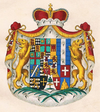The Princely House of Thurn and Taxis (German: das Fürstenhaus Thurn und Taxis) is a German noble family that was a key player in the postal services in Europe in the 16th century and is well known as owners of breweries and builders of many castles.
History

The Tasso (from the Italian for "badger") were a Lombard family in the area of Bergamo. The earliest records place them in Almenno in the Val Brembana around c. 1200 before they fled to the more distant village of Cornello to escape feuding between Bergamo's Guelf Colleoni and the Ghibelline Suardi families. Around 1290, after Milan had conquered Bergamo, Omodeo Tasso organized 32 of his relatives into the Company of Couriers (Compagnia dei Corrieri) and linked Milan with Venice and Rome. The recipient of royal and papal patronage, his post riders were so comparatively efficient that they became known as bergamaschi throughout Italy.
Ruggiero de Tassis was named to the court of the emperor Frederick the Peaceful in 1443. He organized a post system between Bergamo and Vienna by 1450; from Innsbruck to Italy and Styria around 1460; and Vienna with Brussels around 1480. Upon his success, Ruggiero was knighted and made a gentleman of the Chamber. Jannetto de Tassis was appointed Chief Master of Postal Services at Innsbruck in 1489. Philip of Burgundy elevated Janetto's brother Francisco to captain of his post in 1502. Owing to a payment dispute with Philip, Francisco opened his post to public use in 1506. By 1516, Francisco had moved the family to Brussels in Brabant, where they became instrumental to Habsburg rule, linking the rich Low Countries to the Spanish court. The normal route passed through France, but a secondary route across the Alps to Genoa was available in times of hostility.
The name Thurn und Taxis arose from the translation into German of the family's French title. Charles V named Giovanni Battista de Tassis as master of his post in 1520; Maximilian I expanded their network throughout the Holy Roman Empire. In 1624, the family were elevated to grafen ("counts") and they formally adopted the German form of their name in 1650. They were named "princely" in 1695 at the behest of the emperor Leopold I. Their postal service was lost in pieces over the centuries, with the Spanish network being bought by the crown in the 18th century and the German post being purchased by Prussia after the fall of the Free City of Frankfurt in 1866.
Rainer Maria Rilke wrote his Duino Elegies while visiting Princess Marie of Thurn and Taxis (née princess of Hohenlohe) at her family's Duino castle. Rilke later dedicated his only novel The Notebooks of Malte Laurids Brigge to the princess, who was his patroness. Marie's relation to Regensburg's Thurn and Taxis is rather distant, however; she was married to Alexander Thurn and Taxis, a member of the family's branch that in the early 19th century settled in Bohemia (now Czech Republic) and became strongly connected to Czech national culture and history.
Several members of the family have been Knights of Malta.
The current head of the house of Thurn and Taxis is HSH Albert II, 12th Prince of Thurn and Taxis, son of Johannes and his wife, Gloria. The family is one of the wealthiest in Germany. The family has resided in St. Emmeram Castle in Regensburg since 1748. The family's brewery was sold to the Paulaner Group (Munich) in 1996, but still produces beer under the brand of Thurn und Taxis.
Princes of Thurn and Taxis

- Eugen Alexander (1695â€"1714)
- Anselm Franz (1714â€"1739)
- Alexander Ferdinand (1739â€"1773)
- Karl Anselm (1773â€"1805)
- Karl Alexander (1805â€"1827)
- Maximilian Karl (1827â€"1871)
- Maximilian Maria (1871â€"1885)
- Albert I (1885â€"1952)
- Franz Joseph (1952â€"1971)
- Karl August (1971â€"1982)
- Johannes Baptista (1982â€"1990)
- Albert II (1990â€")
The Thurn and Taxis family came to massive media attention during the late-1970s through mid-1980s when late Prince Johannes married Countess Mariae Gloria of Schönburg-Glauchau, a member of an impoverished but mediatized noble family. The couple's wild, "jet set" lifestyle and Princess Gloria's over-the-top appearance (characterized by bright hair colours and avante garde clothes) earned her the nickname "Princess TNT".
Cultural references to Thurn and Taxis

- The mail monopoly of Thurn and Taxis is central to the plot of The Crying of Lot 49 by Thomas Pynchon.
- The board game Thurn and Taxis, by Andreas Seyfarth and Karen Seyfarth, is inspired by the family.
- The protagonist of Walter Jon Williams's Elegy for Angels and Dogs is the head of the Thurn und Taxis family.
- Thurn und Taxis are also mentioned in several volumes of the 163x series by Eric Flint and others, e.g. 1635: The Dreeson Incident and 1636: The Saxon Uprising.
See also

- Brussels' Tour & Taxis
- Czech branch of the House of Thurn and Taxis
- Dukes of Castel Duino, an Italian branch
- House of Thurn and Taxis line of succession
- Order of Parfaite Amitié
- Thurn-und-Taxis Post
References and sources

- Notes
- Sources
- Wolfgang Behringer, Thurn und Taxis, Die Geschichte ihrer Post und ihrer Unternehmen, München, Zürich 1990 ISBN 3-492-03336-9
- Martin Dallmeier, Quellen zur Geschichte des europäischen Postwesens, Kallmünz 1977
- Martin Dallmeier and Martha Schad, Das Fürstliche Haus Thurn und Taxis, 300 Jahre Geschichte in Bildern, Regensburg 1996, ISBN 3-7917-1492-9
- Fritz Ohmann, Die Anfänge des Postwesens und die Taxis, Leipzig 1909
- Joseph Rübsam, Johann Baptista von Taxis, Freiburg im Breisgau 1889
- Marecek, Zdenek, Loucen a Thurn Taxisove. Pohledy do doby minule i nedavne. Obec Loucen, 1998.
External links

Media related to Thurn und Taxis family at Wikimedia Commons
- Thurn und Taxis family homepage
- The House of Thurn und Taxis in Bohemia: 140 years of family history

